Kathleen Jones's Blog, page 12
June 20, 2017
Tuesday Poem: Watermarks Anthology of Wild Swimming - Jenny Arran
The Mountain's Voice
Slate smooth.
Amber through darkness.
Tannins of peat and sheep
cropped turf.
Water of rock
and rain
rushed
to stillness.
In this dark pool
under the sky
rock body
holds time
in liquid form.
The mountain's voice.
Its quiet insistence
ripples my listening thoughts
Wrapping its cold question
So neatly around my offering
of warmth
I would dissolve
For its answer.
I swim.
In a dim liminal memory
of time kept silence.
And the quiet grass
and the shining sky.
© Jenny Arran 2017
Watermarks Anthology
edited by Tanya Shadrick and Rachel Playforth
The Frogmore Press 2017, £7.99
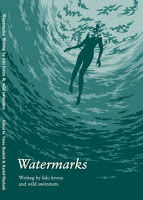
This is just one of the poems from an anthology dedicated to wild swimming. It’s a collection of poetry and prose that celebrates the wild and our connection with the element of water before and after birth. There are some well-known names in this collection, Janet Sutherland, Graham Burchell, Lindsay Zier-Vogel, Jill Munro, Maria Jastrzebska, and Mark Fiddes, alongside some new and exciting voices.
Putting together an anthology is never easy. This was the editors' brief: "we called for work by writers who find inspiration in or near lidos, lakes, sea pools and other wild swimming places. The writing had to be short (a maximum of 1000 words for prose) but supple. We sought work full of quick turns, graceful strokes or surprising dives into the depths: writing which had us catch our breath, laugh in delight or shiver a little." Tanya and Rachel have succeeded brilliantly.
There’s some interesting experimental work here. I particularly liked Holly Dawson’s ‘Unswimming’ - part prose part poetry that tells the story of a pregnant woman who is drawn to the river at the bottom of the garden even though her husband tells her it’s unsafe. He plans to block it off with a wall and a decked terrace. But the ‘I’ of the story has much more primitive instincts. ‘The river pulls me to it. A surging strength picks up the mallet and demolishes half the river wall. There’s something fierce within me that only water can contain. The river says: Do what you will, I’ll still go on and on.’
There’s a lot of humour between these pages, alongside the exhilaration and the sense of danger. These are the last lines of The Non-Swimmer by Jill Munro, a poem about a woman who ‘longed for the security of the flailing label – ‘Unable to Swim’.
Instead, she swallowed hard, girded and glided with her skill;
river-swimming under waterfalls, rock-lined coastal plunges,
then Sweden’s lakes for a water-lillied Valkyrie crossing,
joining nine naked women swimming to their new-found freedom
beneath the wet crackle of a thunderstorm brewing overhead.
Mark Bridge is an eel mocking our eco ambitions. ‘You buy Tuna that’s described as ‘dolphin friendly’. . . . Like you think tuna is an aquatic labrador, wagging its idiot tail in greeting as a dolphin swims past. But eel, the mysterious genius eel, we’re novelty cookery ingredients. Smoked, sliced and served with a poached egg. . . What sort of perversity is that?’ [Mark Bridge eeeooo].
There’s a strong attachment to place in many of the contributions, whether it’s Galway in Ireland, the frigid waters of Iceland, a glacial lake in Canada, or a waterhole in the Australian bush, there are innumerable ‘metaphorical junctions’ as Richard Mabey called them. Swimming can be an ‘immersive experience that anchors body and mind in the present moment and connects us to the elements and the seas around us from which we draw our being and are restored on a deeply physical level’. [Tim Martindale, Galway Blues].
This is a fantastic collection of stories, vignettes, poems and eco-writing for anyone who loves the element of water in ocean, river, and lake.
Watermarks
Writing by lido lovers and wild swimmers
edited by Tanya Shadrick and Rachel Playforth
published by The Frogmore Press, 2017
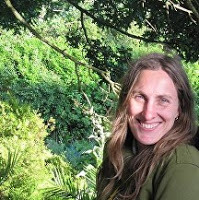 ‘
Jenny Arran
is a visual artist. She grew up in North Wales, loving the wildness, rivers, rocks and the sea. Her poems and paintings reflect a sensory and relational connection to nature. She swims regularly in Pells Pool, as well as the river and sea near Lewes, and takes her children, on holidays, to the pool in her poem.’
‘
Jenny Arran
is a visual artist. She grew up in North Wales, loving the wildness, rivers, rocks and the sea. Her poems and paintings reflect a sensory and relational connection to nature. She swims regularly in Pells Pool, as well as the river and sea near Lewes, and takes her children, on holidays, to the pool in her poem.’
jennyarran.co.uk
Slate smooth.
Amber through darkness.
Tannins of peat and sheep
cropped turf.
Water of rock
and rain
rushed
to stillness.
In this dark pool
under the sky
rock body
holds time
in liquid form.
The mountain's voice.
Its quiet insistence
ripples my listening thoughts
Wrapping its cold question
So neatly around my offering
of warmth
I would dissolve
For its answer.
I swim.
In a dim liminal memory
of time kept silence.
And the quiet grass
and the shining sky.
© Jenny Arran 2017
Watermarks Anthology
edited by Tanya Shadrick and Rachel Playforth
The Frogmore Press 2017, £7.99

This is just one of the poems from an anthology dedicated to wild swimming. It’s a collection of poetry and prose that celebrates the wild and our connection with the element of water before and after birth. There are some well-known names in this collection, Janet Sutherland, Graham Burchell, Lindsay Zier-Vogel, Jill Munro, Maria Jastrzebska, and Mark Fiddes, alongside some new and exciting voices.
Putting together an anthology is never easy. This was the editors' brief: "we called for work by writers who find inspiration in or near lidos, lakes, sea pools and other wild swimming places. The writing had to be short (a maximum of 1000 words for prose) but supple. We sought work full of quick turns, graceful strokes or surprising dives into the depths: writing which had us catch our breath, laugh in delight or shiver a little." Tanya and Rachel have succeeded brilliantly.
There’s some interesting experimental work here. I particularly liked Holly Dawson’s ‘Unswimming’ - part prose part poetry that tells the story of a pregnant woman who is drawn to the river at the bottom of the garden even though her husband tells her it’s unsafe. He plans to block it off with a wall and a decked terrace. But the ‘I’ of the story has much more primitive instincts. ‘The river pulls me to it. A surging strength picks up the mallet and demolishes half the river wall. There’s something fierce within me that only water can contain. The river says: Do what you will, I’ll still go on and on.’
There’s a lot of humour between these pages, alongside the exhilaration and the sense of danger. These are the last lines of The Non-Swimmer by Jill Munro, a poem about a woman who ‘longed for the security of the flailing label – ‘Unable to Swim’.
Instead, she swallowed hard, girded and glided with her skill;
river-swimming under waterfalls, rock-lined coastal plunges,
then Sweden’s lakes for a water-lillied Valkyrie crossing,
joining nine naked women swimming to their new-found freedom
beneath the wet crackle of a thunderstorm brewing overhead.
Mark Bridge is an eel mocking our eco ambitions. ‘You buy Tuna that’s described as ‘dolphin friendly’. . . . Like you think tuna is an aquatic labrador, wagging its idiot tail in greeting as a dolphin swims past. But eel, the mysterious genius eel, we’re novelty cookery ingredients. Smoked, sliced and served with a poached egg. . . What sort of perversity is that?’ [Mark Bridge eeeooo].
There’s a strong attachment to place in many of the contributions, whether it’s Galway in Ireland, the frigid waters of Iceland, a glacial lake in Canada, or a waterhole in the Australian bush, there are innumerable ‘metaphorical junctions’ as Richard Mabey called them. Swimming can be an ‘immersive experience that anchors body and mind in the present moment and connects us to the elements and the seas around us from which we draw our being and are restored on a deeply physical level’. [Tim Martindale, Galway Blues].
This is a fantastic collection of stories, vignettes, poems and eco-writing for anyone who loves the element of water in ocean, river, and lake.
Watermarks
Writing by lido lovers and wild swimmers
edited by Tanya Shadrick and Rachel Playforth
published by The Frogmore Press, 2017
 ‘
Jenny Arran
is a visual artist. She grew up in North Wales, loving the wildness, rivers, rocks and the sea. Her poems and paintings reflect a sensory and relational connection to nature. She swims regularly in Pells Pool, as well as the river and sea near Lewes, and takes her children, on holidays, to the pool in her poem.’
‘
Jenny Arran
is a visual artist. She grew up in North Wales, loving the wildness, rivers, rocks and the sea. Her poems and paintings reflect a sensory and relational connection to nature. She swims regularly in Pells Pool, as well as the river and sea near Lewes, and takes her children, on holidays, to the pool in her poem.’ jennyarran.co.uk
Published on June 20, 2017 07:32
June 17, 2017
The healing power of the natural world
Emily Dickinson, who suffered the trauma of epileptic fits, was often confined to the house and the company of family and a few close friends in order to avoid the stigma of public convulsions. (See Lives Like Loaded Guns by Lyndall Gordon) It created an air of mystery about her as she became increasingly reclusive. Emily found that wandering in the countryside and garden was a healing experience and many of her poems mention wild flora and fauna. She kept a pressed flower collection - quite a popular pastime in the 19th century - and became something of a botanist. Her 'Herbarium' has recently been digitalised by Harvard university library as it is now too fragile to be handled. The pages are both beautiful and sad, arranged in Emily's own fashion and labelled with her tiny writing.
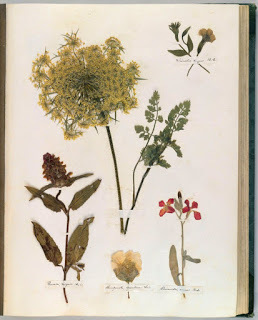
In the middle of the chaos and horror we now find ourselves in, the natural world is incredibly therapeutic. It's sheer beauty and peacefulness is a comfort and a joy. I've been out on the sunny river bank this morning, looking at the flowers and trying to forget, just for a moment, the terrible things on the news channels.
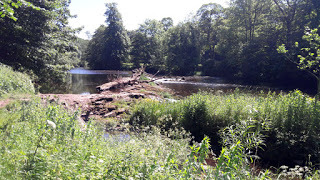
The river, still decorated by the corpses of winter trees, is flowing steadily over the weir as it usually does in summer. The mill pool is mirror-still except for the ripples made by fly-catching brown trout, and the banks are yellow with Mimulus and the purple and white shades of Dame's Violet.
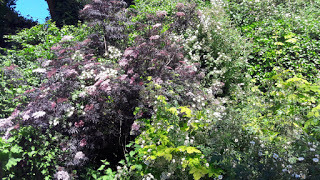
The Rambling Rector is gambolling happily up the cliff and through the pink elderflower, competing busily with the golden hop (which has abandoned the garden and gone feral!).
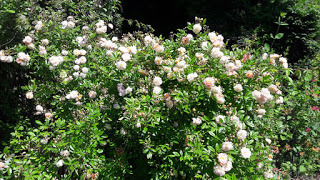
The roses are all beginning to open in the sun. This is a French aristocrat called Ghislaine de Feligonde.
Now, calmer and more peaceful than I was, I'm off to catch a train to Kent to become white van man again and face the madness of the M25 on Monday!

In the middle of the chaos and horror we now find ourselves in, the natural world is incredibly therapeutic. It's sheer beauty and peacefulness is a comfort and a joy. I've been out on the sunny river bank this morning, looking at the flowers and trying to forget, just for a moment, the terrible things on the news channels.

The river, still decorated by the corpses of winter trees, is flowing steadily over the weir as it usually does in summer. The mill pool is mirror-still except for the ripples made by fly-catching brown trout, and the banks are yellow with Mimulus and the purple and white shades of Dame's Violet.

The Rambling Rector is gambolling happily up the cliff and through the pink elderflower, competing busily with the golden hop (which has abandoned the garden and gone feral!).

The roses are all beginning to open in the sun. This is a French aristocrat called Ghislaine de Feligonde.
Now, calmer and more peaceful than I was, I'm off to catch a train to Kent to become white van man again and face the madness of the M25 on Monday!
Published on June 17, 2017 06:56
June 13, 2017
Tuesday Poem: Tony Walsh - Net Worked - Poetry and Politics
Nick Laird, in his Guardian article, '
Poetry is always a form of political intervention'
, makes the case for poetry as the perfect weapon against demagogues. "Populism claims to love the people but of course it hates the individual, and poetry is one mode of opposing that. It only deals in individuals, while its trust in complication is at the far end of the verbal scale from the demagogue’s three-word phrases framed as hoarse imperatives.”
Nick argues that it is language that is the most effective weapon, for both sides. We have to beware ‘Alternative Facts’. “Those who would harm us, and have us harm others, target the language, as Orwell and Huxley and others described. The discourse is debased. . . There is a terrible violence done to human thought when the official discourse normalises lies, racism, sexual violence. Poetry is one kind of civic response to the barbarities of the two-bit huckster’s spiel, his slogans, his dog whistles: it insists on an attempt to speak the truth, even if, as Dickinson has it, it tells it slant.”
He goes on to say that “To read poetry, to return to a space for second thoughts, for complexity, for empathy, for words that are not defensive or aggressive or divisive or belittling, renews a faith in language and stillness, and a courage in the possibilities of protest, of “speaking truth to power”.” Poetry is an ‘ethical space’ and it enables us to imagine the reality of other people’s suffering.
This is Manchester poet Tony Walsh's poem about the surprising result of the UK elections and the part that young people played in it. Warning: Strong Language! He doesn't pull any punches.
Nick argues that it is language that is the most effective weapon, for both sides. We have to beware ‘Alternative Facts’. “Those who would harm us, and have us harm others, target the language, as Orwell and Huxley and others described. The discourse is debased. . . There is a terrible violence done to human thought when the official discourse normalises lies, racism, sexual violence. Poetry is one kind of civic response to the barbarities of the two-bit huckster’s spiel, his slogans, his dog whistles: it insists on an attempt to speak the truth, even if, as Dickinson has it, it tells it slant.”
He goes on to say that “To read poetry, to return to a space for second thoughts, for complexity, for empathy, for words that are not defensive or aggressive or divisive or belittling, renews a faith in language and stillness, and a courage in the possibilities of protest, of “speaking truth to power”.” Poetry is an ‘ethical space’ and it enables us to imagine the reality of other people’s suffering.
This is Manchester poet Tony Walsh's poem about the surprising result of the UK elections and the part that young people played in it. Warning: Strong Language! He doesn't pull any punches.
Published on June 13, 2017 12:06
June 11, 2017
Appleby Horse Fair 2017 - Submachine Guns and Winter Weather
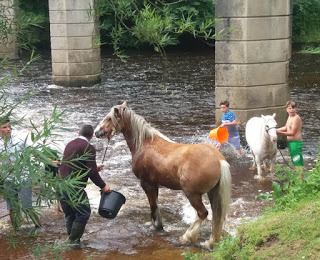
It's Appleby Horse Fair weekend - all hatches battened down, windows boarded up, roads closed and the most intensive police presence I've ever seen. Armed police were particularly visible - not a normal occurrence.
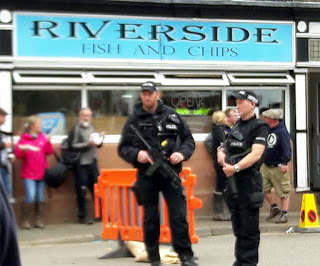 Rather blurred, but they don't like you taking pics.The attendance this year has been much less than usual - fewer horses and caravans - fewer tourists. The main reason probably the appalling weather. Temperatures have been down in single figures at times and grey, wild, wet weather all day. The wind has been the most unpleasant feature. It has been 'blowing a hoolie' as we say up here.
Rather blurred, but they don't like you taking pics.The attendance this year has been much less than usual - fewer horses and caravans - fewer tourists. The main reason probably the appalling weather. Temperatures have been down in single figures at times and grey, wild, wet weather all day. The wind has been the most unpleasant feature. It has been 'blowing a hoolie' as we say up here. 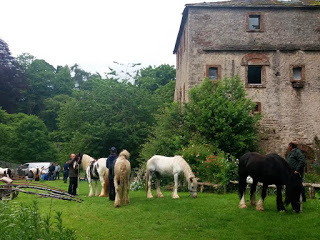
Down at the Mill we usually get a lot of horses and campers, and the river sees a lot of action as they run the trotting horses and the gigs through it, but the river's been closed for much of the weekend because of the high water levels.
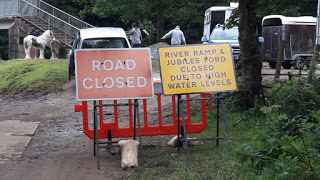
Still, we've seen some beautiful horses. These are a few of the best.
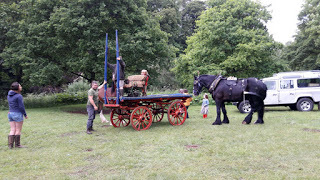
This gorgeous three year-old Shire horse from Shropshire was being harnessed on the river bank. His owner told me it was the first horse he'd ever broken by himself.
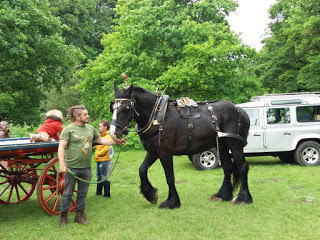 Proud Owner
Proud Owner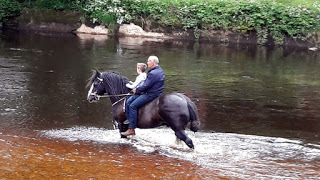
Normally the horses would be 'swum' in the deep parts of the river. Not this year though. This stallion, with his man and boy, was just pludging around in the shallows.
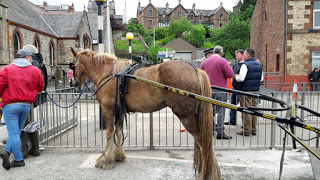 The horses spend a lot of time tied up outside the pubs waiting for their owners!
The horses spend a lot of time tied up outside the pubs waiting for their owners!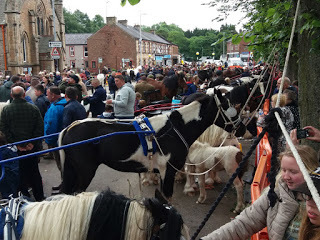 A lot of horse dealing going on here.
A lot of horse dealing going on here.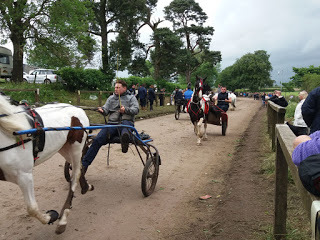
These are the trotting horses showing off their paces on one of the lanes around Appleby. They really fly - taking a photo is very difficult! By the time you've pressed the shutter they're out of the frame.
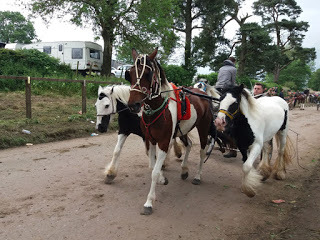
This guy had four in hand - one harnessed to the gig with two younger horses on each side and one tied to the back.
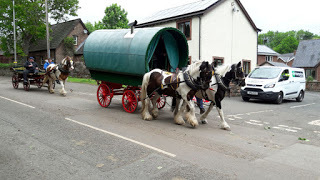
This is one of the Vardas, drawn by a matching pair. A lovely sight. But they were on their way home, leaving because of the weather.
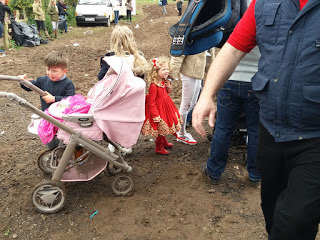
And you can see why. These children were all dressed up for a good time and not enjoying the mud at all.
Published on June 11, 2017 12:43
June 7, 2017
Tuesday Poem: Sojourner Truth - Ain't I a Woman?
Delivered at the Women's Convention, Ohio, 1851
Well, children, where there is so much racket there must be something out of kilter. I think that, 'twixt the negroes of the South and the women at the North, all talking about rights, the white men will be in a fix pretty soon. But what's all this here talking about?
That man over there says that women need to be helped into carriages, and lifted over ditches, and to have the best place everywhere. Nobody ever helps me into carriages, or over mud-puddles, or gives me any best place! And ain't I a woman? Look at me! Look at my arm! I have ploughed and planted, and gathered into barns, and no man could head me! And ain't I a woman? I could work as much and eat as much as a man - when I could get it - and bear the lash as well! And ain't I a woman? I have borne thirteen children, and seen most all sold off to slavery, and when I cried out with my mother's grief, none but Jesus heard me! And ain't I a woman?
Then they talk about this thing in the head; what's this they call it? [member of audience whispers "Intellect!"] That's it, honey. What's that got to do with women's rights or negroes rights? If my cup won't hold but a pint, and yours holds a quart, wouldn't you be mean not to let me have my little half measure full?
Then that little man in black there, he says women can't have as much rights as men, 'cause Christ wasn't a woman! Where did your Christ come from? Where did your Christ come from? From God and a woman! Man had nothing to do with him.
If the first woman God ever made was strong enough to turn the world upside down all alone, these women together ought to be able to turn it back, and get it right side up again! And now they is asking to do it, the men better let them.
Obliged to you for hearing me, and now old Sojourner ain't got nothing more to say.
Sojourner Truth
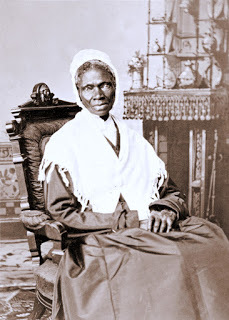
I thought today we needed something optimistic and inspirational. I'm not posting this from a Feminist perspective, but as an example of Hope in the face of what look like insurmountable odds.
Who could have thought back in 1851 that there could be equal rights for men and women, people of colour and people with skins of a different shade? It took a very long time to win it, but those later victories were built on the efforts and the rhetoric of activists like Sojourner Truth. She was an ex-slave and Christian convert, born into slavery as Belle Baumfree. She escaped from her owner in 1826 with an infant daughter, living with protectors in New York State where limited emancipation was given in 1827. She changed her name when she became a member of the Evangelical movement. Sojourner is most famous for winning a court case against her former owner who had sold one of her children illegally to a plantation in Alabama. She was the first black woman to win a case against a white man. Her life didn't get much easier. When a man, a Christian evangelist she kept house for, died she was accused of poisoning him, but was acquitted of the crime.
We have never needed more of Sojourner Truth's courage and persistence than we do today.
Well, children, where there is so much racket there must be something out of kilter. I think that, 'twixt the negroes of the South and the women at the North, all talking about rights, the white men will be in a fix pretty soon. But what's all this here talking about?
That man over there says that women need to be helped into carriages, and lifted over ditches, and to have the best place everywhere. Nobody ever helps me into carriages, or over mud-puddles, or gives me any best place! And ain't I a woman? Look at me! Look at my arm! I have ploughed and planted, and gathered into barns, and no man could head me! And ain't I a woman? I could work as much and eat as much as a man - when I could get it - and bear the lash as well! And ain't I a woman? I have borne thirteen children, and seen most all sold off to slavery, and when I cried out with my mother's grief, none but Jesus heard me! And ain't I a woman?
Then they talk about this thing in the head; what's this they call it? [member of audience whispers "Intellect!"] That's it, honey. What's that got to do with women's rights or negroes rights? If my cup won't hold but a pint, and yours holds a quart, wouldn't you be mean not to let me have my little half measure full?
Then that little man in black there, he says women can't have as much rights as men, 'cause Christ wasn't a woman! Where did your Christ come from? Where did your Christ come from? From God and a woman! Man had nothing to do with him.
If the first woman God ever made was strong enough to turn the world upside down all alone, these women together ought to be able to turn it back, and get it right side up again! And now they is asking to do it, the men better let them.
Obliged to you for hearing me, and now old Sojourner ain't got nothing more to say.
Sojourner Truth

I thought today we needed something optimistic and inspirational. I'm not posting this from a Feminist perspective, but as an example of Hope in the face of what look like insurmountable odds.
Who could have thought back in 1851 that there could be equal rights for men and women, people of colour and people with skins of a different shade? It took a very long time to win it, but those later victories were built on the efforts and the rhetoric of activists like Sojourner Truth. She was an ex-slave and Christian convert, born into slavery as Belle Baumfree. She escaped from her owner in 1826 with an infant daughter, living with protectors in New York State where limited emancipation was given in 1827. She changed her name when she became a member of the Evangelical movement. Sojourner is most famous for winning a court case against her former owner who had sold one of her children illegally to a plantation in Alabama. She was the first black woman to win a case against a white man. Her life didn't get much easier. When a man, a Christian evangelist she kept house for, died she was accused of poisoning him, but was acquitted of the crime.
We have never needed more of Sojourner Truth's courage and persistence than we do today.
Published on June 07, 2017 02:06
June 2, 2017
Theresa May is not a Feminist
Watching Theresa May on TV or in Parliament is excruciating. She may have risen to the highest position a woman can aspire to – de facto head of state – but one thing’s for sure – she ain’t no feminist.
Neither was Margaret Thatcher. In fact the only service Mrs T did for Feminism was to make girls realise that their dreams of occupying the highest positions could actually come true. They too could one day become Prime Minister. You didn’t have to be Lady Di and marry a prince to get to the top.
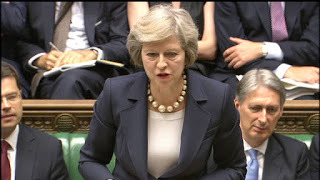 Theresa May has to constantly watch her backBut wholesale smashing of the glass ceiling didn’t happen. In fact, the cause of equality for women (both in opportunity and in fact) didn’t advance much, if at all. Many would say that women’s lives got harder. They were increasingly expected to juggle family, careers and – since Mrs T introduced ‘Care in the Community’ by abolishing a lot of useful institutions – many were also acting as carers. The pay gap between men and women stayed much the same despite the Equal Pay Act, passed 45 years ago. It currently stands at
an average of 13.9%
, though the gap gets wider the higher up the tree you go.
Theresa May has to constantly watch her backBut wholesale smashing of the glass ceiling didn’t happen. In fact, the cause of equality for women (both in opportunity and in fact) didn’t advance much, if at all. Many would say that women’s lives got harder. They were increasingly expected to juggle family, careers and – since Mrs T introduced ‘Care in the Community’ by abolishing a lot of useful institutions – many were also acting as carers. The pay gap between men and women stayed much the same despite the Equal Pay Act, passed 45 years ago. It currently stands at
an average of 13.9%
, though the gap gets wider the higher up the tree you go.
Understandably, given the above, the number of women in public life didn’t increase under Thatcher. It did under a Labour government, but they did it by introducing unpopular notions such as ‘positive discrimination’. But women are still outnumbered 4-1 in Parliament and there are few women in Theresa May’s cabinet. If you want to depress yourself further, click this link to the Fawcett Society's statistics of women in positions of influence in society. There are currently no female political editors of a national newspaper.
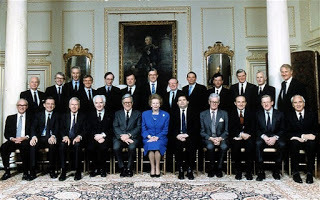 Mrs Thatcher's cabinet of men - a lonely position
Mrs Thatcher's cabinet of men - a lonely position
Women like Theresa May and Margaret Thatcher are probably less likely to be sympathetic to Feminist issues for several reasons:-
1. They have had to fight their way to the top – if they can succeed then why can’t other women?
2. They have fought their way to the top – by embracing a man’s view of how the world works and becoming complicit in a system created and controlled by men for thousands of years, for the benefit of men. Women who acquiesce in this are endorsing the system that has created gender inequality.
3. They have fought their way to the top – by adopting male criteria about what power looks like. They have accepted Masculist values. To change a system where Feminist values are seen as ‘weak’ is to appear weak yourself.
4. They have fought their way to the top. These powerful women, like powerful men, rely on powerful men to support them. The Tory coffers are filled by male billionaires – and no, they aren’t Feminists either! In Parliament they also have to rely on a largely male support network among politicians. Mrs T was taken down by Rottweiler Geoffrey Howe.
Theresa May knows that her closest associates would like her job. Far from supporting her, the other women in the Cabinet would like her job too.
It is the system of government and finance throughout the world that has created inequality for women. It is not female friendly. (It’s not friendly to men either, but that’s another blog!) It is a system created by men, because until recently women didn’t even have a vote, let alone a voice in the decision making. Until relatively recently women weren’t even allowed control or even ownership of their own assets. The Married Women’s Property Act was passed in 1882 – two years after my grandmother was born, but it didn’t cover everything.
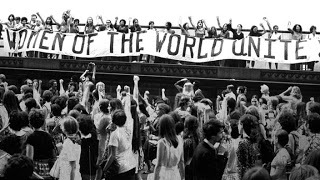 It's amazing what women can achieve when they pull together
It's amazing what women can achieve when they pull together
A woman was a perpetual child at law - she had no right to a separate legal identity of her own and if she had to sue she had to do so through her ‘next friend’, who had to be a man. Why do you think the marriage service asks ‘Who giveth this women to this man?’ She was given by the father to the husband – a transfer of property. The woman whose marriage failed could not have custody or control of her children who ‘belonged’ to her husband. A widow had to have her finances administered by her male relatives who were often far less competent than she was. History is riddled with women whose fortunes were frittered away by their relatives. (Sara Coleridge was one of them). Some of these outrages weren’t legally sorted out until the second half of the 20th century.
Feminism has made some strides, but not enough. We live in an unequal society, one where the plight of women across the world is parlous – punished for being raped, kept as prisoners in their own homes, subjected to every kind of human rights abuse across a world increasingly becoming a war zone, denied control over their own reproduction in many countries including the USA, still excluded from a lot of career roles and public office because of their gender.
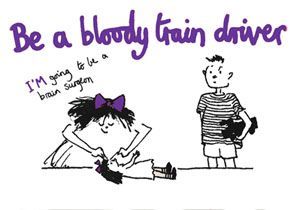
The world created by men like Vladimir Putin, Bashar al Assad and Donald Trump does not look attractive. We need a new system – a true democracy that takes no account of gender, religion, class or ethnicity. A true meritocracy. I would like to hope that we can get it, but based on the political madness I see around me I’m not optimistic.
Neither was Margaret Thatcher. In fact the only service Mrs T did for Feminism was to make girls realise that their dreams of occupying the highest positions could actually come true. They too could one day become Prime Minister. You didn’t have to be Lady Di and marry a prince to get to the top.
 Theresa May has to constantly watch her backBut wholesale smashing of the glass ceiling didn’t happen. In fact, the cause of equality for women (both in opportunity and in fact) didn’t advance much, if at all. Many would say that women’s lives got harder. They were increasingly expected to juggle family, careers and – since Mrs T introduced ‘Care in the Community’ by abolishing a lot of useful institutions – many were also acting as carers. The pay gap between men and women stayed much the same despite the Equal Pay Act, passed 45 years ago. It currently stands at
an average of 13.9%
, though the gap gets wider the higher up the tree you go.
Theresa May has to constantly watch her backBut wholesale smashing of the glass ceiling didn’t happen. In fact, the cause of equality for women (both in opportunity and in fact) didn’t advance much, if at all. Many would say that women’s lives got harder. They were increasingly expected to juggle family, careers and – since Mrs T introduced ‘Care in the Community’ by abolishing a lot of useful institutions – many were also acting as carers. The pay gap between men and women stayed much the same despite the Equal Pay Act, passed 45 years ago. It currently stands at
an average of 13.9%
, though the gap gets wider the higher up the tree you go.Understandably, given the above, the number of women in public life didn’t increase under Thatcher. It did under a Labour government, but they did it by introducing unpopular notions such as ‘positive discrimination’. But women are still outnumbered 4-1 in Parliament and there are few women in Theresa May’s cabinet. If you want to depress yourself further, click this link to the Fawcett Society's statistics of women in positions of influence in society. There are currently no female political editors of a national newspaper.
 Mrs Thatcher's cabinet of men - a lonely position
Mrs Thatcher's cabinet of men - a lonely positionWomen like Theresa May and Margaret Thatcher are probably less likely to be sympathetic to Feminist issues for several reasons:-
1. They have had to fight their way to the top – if they can succeed then why can’t other women?
2. They have fought their way to the top – by embracing a man’s view of how the world works and becoming complicit in a system created and controlled by men for thousands of years, for the benefit of men. Women who acquiesce in this are endorsing the system that has created gender inequality.
3. They have fought their way to the top – by adopting male criteria about what power looks like. They have accepted Masculist values. To change a system where Feminist values are seen as ‘weak’ is to appear weak yourself.
4. They have fought their way to the top. These powerful women, like powerful men, rely on powerful men to support them. The Tory coffers are filled by male billionaires – and no, they aren’t Feminists either! In Parliament they also have to rely on a largely male support network among politicians. Mrs T was taken down by Rottweiler Geoffrey Howe.
Theresa May knows that her closest associates would like her job. Far from supporting her, the other women in the Cabinet would like her job too.
It is the system of government and finance throughout the world that has created inequality for women. It is not female friendly. (It’s not friendly to men either, but that’s another blog!) It is a system created by men, because until recently women didn’t even have a vote, let alone a voice in the decision making. Until relatively recently women weren’t even allowed control or even ownership of their own assets. The Married Women’s Property Act was passed in 1882 – two years after my grandmother was born, but it didn’t cover everything.
 It's amazing what women can achieve when they pull together
It's amazing what women can achieve when they pull togetherA woman was a perpetual child at law - she had no right to a separate legal identity of her own and if she had to sue she had to do so through her ‘next friend’, who had to be a man. Why do you think the marriage service asks ‘Who giveth this women to this man?’ She was given by the father to the husband – a transfer of property. The woman whose marriage failed could not have custody or control of her children who ‘belonged’ to her husband. A widow had to have her finances administered by her male relatives who were often far less competent than she was. History is riddled with women whose fortunes were frittered away by their relatives. (Sara Coleridge was one of them). Some of these outrages weren’t legally sorted out until the second half of the 20th century.
Feminism has made some strides, but not enough. We live in an unequal society, one where the plight of women across the world is parlous – punished for being raped, kept as prisoners in their own homes, subjected to every kind of human rights abuse across a world increasingly becoming a war zone, denied control over their own reproduction in many countries including the USA, still excluded from a lot of career roles and public office because of their gender.

The world created by men like Vladimir Putin, Bashar al Assad and Donald Trump does not look attractive. We need a new system – a true democracy that takes no account of gender, religion, class or ethnicity. A true meritocracy. I would like to hope that we can get it, but based on the political madness I see around me I’m not optimistic.
Published on June 02, 2017 08:53
May 29, 2017
Tuesday Poem: Remembering Norman Nicholson
On the Dismantling of Millom Ironworks
............They cut up the carcass of the old ironworks
Like a fat beast in a slaughter-house: they shovelled my childhood
On to a rubbish heap. Here my father's father,
Foreman of the back furnace, unsluiced the metal lava
To slop in fiery gutters across the foundry floor
And boil round the workmen's boots: here five generations
Toasted the bread they earned at a thousand degrees Fahrenheit
And the town thrived on its iron diet.
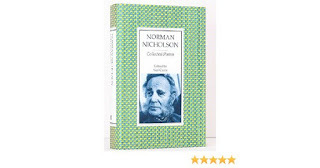 The Faber and Faber edition of Norman's Collected PoemsToday is the thirtieth anniversary of the death of Lake District poet Norman Nicholson, who is being remembered more and more for his fervent environmentalism. He spent his life in Millom, a mining town at the southern end of the Lake District, and some of his best poems are about the interaction of human beings with the environment. They record the de-industrialisation of the north and the human as well as environmental cost. This is another extract from the poem describing the attempt to restore the area to something resembling a natural landscape:
The Faber and Faber edition of Norman's Collected PoemsToday is the thirtieth anniversary of the death of Lake District poet Norman Nicholson, who is being remembered more and more for his fervent environmentalism. He spent his life in Millom, a mining town at the southern end of the Lake District, and some of his best poems are about the interaction of human beings with the environment. They record the de-industrialisation of the north and the human as well as environmental cost. This is another extract from the poem describing the attempt to restore the area to something resembling a natural landscape:
.................mines
Drowned under stagnant water, chimneys felled and uprooted,
Slagbanks ploughed down to half their height, all cragginess,
Scrag-end and scree ironed out, and re-soiled and greened over . . .
But now, the residents and workers are pensioned off along with their 'hopes, gains, profits,' and desperations, with little to look forward to other than the newly built 'Old People's Bungalows'. 'The town shrinks and dwindles'. His stark description of a landscape devastated by heavy industry will ring true for anyone who has witnessed it.
Reservoir tanks gape dry beside cracked, empty pig-beds;
And one last core of clinker, like the stump of a dead volcano,
Juts up jagged and unblastable. Stand on the rickety pier,
Look left along the line where gantry and crane and coke-bank
Ten years ago blocked all the view - and now you're staring
Bang at Black Combe. The wind resumes its Right of Way.
In another poem on the Closing of Millom Ironworks, Norman describes the men who 'morning after morning' stand out side the churchyard gate 'Hands in pockets, shoulders to the slag,' - the fathers of boys he was at school with, all without work. 'It's beautiful to breathe the sharp night air', Norman observes, but what use is all this beauty if there is no work? Whichever way the wind is blowing, 'its a cold wind now.'
Many of Norman's most famous poems have a strong environmental message. 'Windscale' was written just after what is now regarded as one of the world's worst nuclear emission disasters of the 20th century, though it was downplayed at the time. Norman privately blamed his wife's breast cancer on the radiation. He was also acutely aware that the planet couldn't sustain human beings in the way we were behaving. 'Elm Decline' is a frightening poem describing deforestation and the consequences of industries that 'channel a poisoned rain' down onto the land. In 'Gathering Sticks on Sunday', he writes of what he sees as the consequences: ....... 'soon,
The living world of men
Will take a lunar look, as dead as slag,
And moon and earth will stare at one another
Like the cold, yellow skulls of child and mother.'
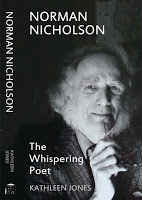
There will be a celebration of Norman's life and poetry on Saturday afternoon in St George's Church, Millom (where you can also see his commemorative stained glass window) at 2pm. All welcome. Various members of the Norman Nicholson Society (including me) will be reading his poems and talking about his life.
If you'd like to know more about Norman Nicholson's life, my biography 'The Whispering Poet' is available on Amazon or to order from all good bookshops. Paperback £8.99 and Kindle edition £2.58
............They cut up the carcass of the old ironworks
Like a fat beast in a slaughter-house: they shovelled my childhood
On to a rubbish heap. Here my father's father,
Foreman of the back furnace, unsluiced the metal lava
To slop in fiery gutters across the foundry floor
And boil round the workmen's boots: here five generations
Toasted the bread they earned at a thousand degrees Fahrenheit
And the town thrived on its iron diet.
 The Faber and Faber edition of Norman's Collected PoemsToday is the thirtieth anniversary of the death of Lake District poet Norman Nicholson, who is being remembered more and more for his fervent environmentalism. He spent his life in Millom, a mining town at the southern end of the Lake District, and some of his best poems are about the interaction of human beings with the environment. They record the de-industrialisation of the north and the human as well as environmental cost. This is another extract from the poem describing the attempt to restore the area to something resembling a natural landscape:
The Faber and Faber edition of Norman's Collected PoemsToday is the thirtieth anniversary of the death of Lake District poet Norman Nicholson, who is being remembered more and more for his fervent environmentalism. He spent his life in Millom, a mining town at the southern end of the Lake District, and some of his best poems are about the interaction of human beings with the environment. They record the de-industrialisation of the north and the human as well as environmental cost. This is another extract from the poem describing the attempt to restore the area to something resembling a natural landscape:.................mines
Drowned under stagnant water, chimneys felled and uprooted,
Slagbanks ploughed down to half their height, all cragginess,
Scrag-end and scree ironed out, and re-soiled and greened over . . .
But now, the residents and workers are pensioned off along with their 'hopes, gains, profits,' and desperations, with little to look forward to other than the newly built 'Old People's Bungalows'. 'The town shrinks and dwindles'. His stark description of a landscape devastated by heavy industry will ring true for anyone who has witnessed it.
Reservoir tanks gape dry beside cracked, empty pig-beds;
And one last core of clinker, like the stump of a dead volcano,
Juts up jagged and unblastable. Stand on the rickety pier,
Look left along the line where gantry and crane and coke-bank
Ten years ago blocked all the view - and now you're staring
Bang at Black Combe. The wind resumes its Right of Way.
In another poem on the Closing of Millom Ironworks, Norman describes the men who 'morning after morning' stand out side the churchyard gate 'Hands in pockets, shoulders to the slag,' - the fathers of boys he was at school with, all without work. 'It's beautiful to breathe the sharp night air', Norman observes, but what use is all this beauty if there is no work? Whichever way the wind is blowing, 'its a cold wind now.'
Many of Norman's most famous poems have a strong environmental message. 'Windscale' was written just after what is now regarded as one of the world's worst nuclear emission disasters of the 20th century, though it was downplayed at the time. Norman privately blamed his wife's breast cancer on the radiation. He was also acutely aware that the planet couldn't sustain human beings in the way we were behaving. 'Elm Decline' is a frightening poem describing deforestation and the consequences of industries that 'channel a poisoned rain' down onto the land. In 'Gathering Sticks on Sunday', he writes of what he sees as the consequences: ....... 'soon,
The living world of men
Will take a lunar look, as dead as slag,
And moon and earth will stare at one another
Like the cold, yellow skulls of child and mother.'

There will be a celebration of Norman's life and poetry on Saturday afternoon in St George's Church, Millom (where you can also see his commemorative stained glass window) at 2pm. All welcome. Various members of the Norman Nicholson Society (including me) will be reading his poems and talking about his life.
If you'd like to know more about Norman Nicholson's life, my biography 'The Whispering Poet' is available on Amazon or to order from all good bookshops. Paperback £8.99 and Kindle edition £2.58
Published on May 29, 2017 15:56
May 28, 2017
What to do with Stuff? Writer's Stuff.
The Mill is enormous and, even with lodgers occupying some of it, often defeats my efforts to keep it basically clean and tidy, let alone well-maintained and orderly! And, as Neil is usually in Italy, it is a one-woman battle. With so much space and so little time, it's tempting to allow 'Stuff' to accumulate. But, lately, with Neil away so much, we've been talking about down-sizing. The floods, too, have precipitated a re-think of what we keep and where. The ground floor and mezzanine workshops are no longer safe.
I am having a clear-out.
Every book I write generates a vast amount of research, manuscript notes, photo-copied material, correspondence, newspaper clippings - the list is endless (and that's not counting all the files on the computer). Lately I've been looking at the stacks of plastic storage boxes and files and wondering what I should do with them all. Most of this material is never likely to be revisited by me. If I was to be run over by a bus tomorrow (as my grandmother used to say) what on earth would my children make of it? And then there are all my notebooks and diaries, kept since I was fourteen, family memorabilia inherited from my parents and grandparents. I can hardly move for boxes. Something has to be done!!
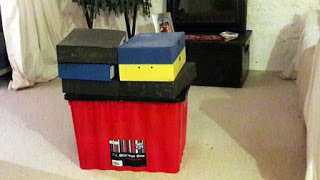 Just one book's worth of boxes (and I've written 17 of them!)
Just one book's worth of boxes (and I've written 17 of them!)
Recently I took the first steps to organise its disposal. One of the biggest collections of material concerns Catherine Cookson, including autograph letters to and from her and her friends, as well as letters from her agents and publishers. There are also the tapes she dictated, telling a confidential - and very controversial - version of her life. There are photographs and a few objects that belonged to Catherine and her husband, and the whole research trail that led to the discovery of her father's identity.
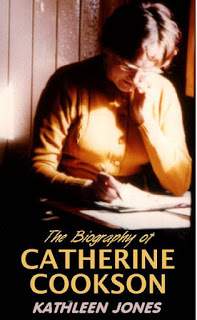
I offered it as a gift to Newcastle University's Robinson Library and they accepted. It seemed the most suitable place to house Catherine's archive. I delivered it the other day in the back of my car and it was a great relief to watch it all being wheeled off on a trolley. I'm not responsible for it any more, and the general public will be able to have access to all this original material. It's where it belongs - beside the Tyne.
Now all I have to do is work out what to do with the remaining sixteen boxes of 'stuff'!
I am having a clear-out.
Every book I write generates a vast amount of research, manuscript notes, photo-copied material, correspondence, newspaper clippings - the list is endless (and that's not counting all the files on the computer). Lately I've been looking at the stacks of plastic storage boxes and files and wondering what I should do with them all. Most of this material is never likely to be revisited by me. If I was to be run over by a bus tomorrow (as my grandmother used to say) what on earth would my children make of it? And then there are all my notebooks and diaries, kept since I was fourteen, family memorabilia inherited from my parents and grandparents. I can hardly move for boxes. Something has to be done!!
 Just one book's worth of boxes (and I've written 17 of them!)
Just one book's worth of boxes (and I've written 17 of them!)Recently I took the first steps to organise its disposal. One of the biggest collections of material concerns Catherine Cookson, including autograph letters to and from her and her friends, as well as letters from her agents and publishers. There are also the tapes she dictated, telling a confidential - and very controversial - version of her life. There are photographs and a few objects that belonged to Catherine and her husband, and the whole research trail that led to the discovery of her father's identity.

I offered it as a gift to Newcastle University's Robinson Library and they accepted. It seemed the most suitable place to house Catherine's archive. I delivered it the other day in the back of my car and it was a great relief to watch it all being wheeled off on a trolley. I'm not responsible for it any more, and the general public will be able to have access to all this original material. It's where it belongs - beside the Tyne.
Now all I have to do is work out what to do with the remaining sixteen boxes of 'stuff'!
Published on May 28, 2017 15:32
May 23, 2017
Tuesday Poem: Kindness, by Naomi Shihab Nye
Before you know what kindness really is
you must lose things,
feel the future dissolve in a moment
like salt in a weakened broth.
What you held in your hand,
what you counted and carefully saved,
all this must go so you know
how desolate the landscape can be
between the regions of kindness.
How you ride and ride
thinking the bus will never stop,
the passengers eating maize and chicken
will stare out the window forever.
Before you learn the tender gravity of kindness
you must travel where the Indian in a white poncho
lies dead by the side of the road.
You must see how this could be you,
how he too was someone
who journeyed through the night with plans
and the simple breath that kept him alive.
Before you know kindness as the deepest thing inside,
you must know sorrow as the other deepest thing.
You must wake up with sorrow.
You must speak to it till your voice
catches the thread of all sorrows
and you see the size of the cloth.
Then it is only kindness that makes sense anymore,
only kindness that ties your shoes
and sends you out into the day to gaze at bread,
only kindness that raises its head
from the crowd of the world to say
It is I you have been looking for,
and then goes with you everywhere
like a shadow or a friend.
From Words Under the Words: Selected Poems. Copyright © 1995 by Naomi Shihab Nye.
I wasn't going to post a Tuesday Poem today because yesterday I was in Manchester and felt too tired to do anything when I got back last night. I fell into bed without realising the terrible events that were unfolding in the city I'd just left. Today I feel unbearably sad, not just because of what has happened, but also because of what some people are going to use the tragedy for. The images of grieving parents and injured children will spark a wave of anger and hatred directed towards innocent people who just happen to share a religion or a place of origin with the perpetrators. Hate has somehow become acceptable.
Visiting Europe so often, I see images in a media less squeamish than ours about showing unedited news items. Pictures of dead and mutilated children - parents carrying their bloodied offspring to hospitals that have also been bombed. It's difficult to avoid knowing what is happening in the Middle East. Perhaps this 'shielding' is what is preventing people here from understanding the direct link between events there and terrorism here. We have to think about why this is happening - not talk uselessly of 'radicalisation'. The most radicalising thing of all is to see your families, your compatriots, your friends, being blown up by bombs, missiles and drones that have a 'Made in Britain' or 'Made in the USA' label on them. The Middle Eastern countries, Syria, Iraq, Libya, Yemen, Afghanistan, are being destroyed by weapons made by us in the west and sold to states who are not scrupulous about using them or selling them on to terrorist organisations. Hundreds of thousands of child refugees face starvation, deprivation, drowning and statelessness to escape the carnage. We have given them a cold shoulder rather than the support they deserve.
I am too sad to cry about the mess we have created or the suffering of the people involved. The feelings are like a physical pain. And I look at our so-called 'leaders' and despair. The landscape is indeed desolate 'between the regions of kindness'.
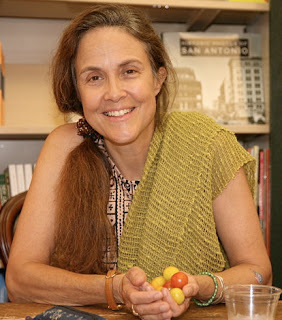 Naomi Shihab Nye 's father is a Palestinian refugee, her mother American. She is an award-winning poet and author currently living in the USA. "Her poems are based on heritage and peace and are connected to her experience as an Arab-American. Her work has been acknowledged by many journals and reviews throughout the world. In 2009, she was elected as Chancellor of the Academy of American Poets."
Naomi Shihab Nye 's father is a Palestinian refugee, her mother American. She is an award-winning poet and author currently living in the USA. "Her poems are based on heritage and peace and are connected to her experience as an Arab-American. Her work has been acknowledged by many journals and reviews throughout the world. In 2009, she was elected as Chancellor of the Academy of American Poets." Many thanks to my Facebook friends for sharing this poem.
Published on May 23, 2017 13:08
May 22, 2017
The Guilty Pleasures of Cosy Crime
Okay, so I like Cosy Crime as much as I like Nordic Noir. I admit it. There’s only so much psychopathy I can take. Alone in the Mill, in the middle of the night, I turn to Cosy Crime, where everybody (except the victim of course) ends up safe and sound and nobody mourns the murdered soul because obviously they had it coming to them. Anything else is just a little too real and likely to render me sleepless and paranoid about every tiny noise.
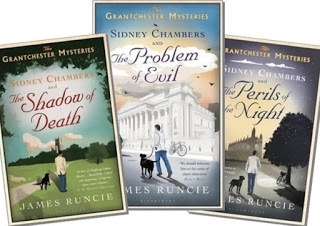
I’ve always loved solving mysteries, in the way that I love puzzles of any kind, so crime fiction has been an addiction since childhood. (Remember Nancy Drew?) Agatha Christie was on the bookshelves at home, but I always found her books rather cold and clinical. My mother had the Father Brown mysteries by G.K. Chesterton and, although I didn’t like them as much as she did, I liked the idea of natural justice that they put forward. Father Brown’s solution to the case didn’t always involve the police – but the punishment always fitted the crime.
James Runcie’s Grantchester mysteries seem to follow this tradition. The 32 year old hero, Canon Stephen Chambers, has a privileged position as an Anglican priest – people tell him things and feel that he has a right to probe their consciences and ask awkward questions about their private lives. The stories begin in 1953 and continue through to 1977, so we see the character develop.
I prefer the Stephen Chambers of the books to the TV detective priest, because the books are more literary (he’s very well read is our Stephen) and there is more moral subtlety. I don’t mind his religious dilemmas, even though I’m an atheist, because he is much more of a Doubting Thomas than Father Brown ever was. Less smug too, and very human. The TV adaptations make Chambers far too black and white. I watched a couple of them and then didn’t bother to watch again. The books are more ‘real’.
What I do like about the stories is what they reveal of village life with its hierarchies, jealousies and snobberies – the gossip and the secrets that are never really secret. And they are very well crafted- Runcie is a formidable writer, not surprising given his personal history. He is the son of a former Archbishop of Canterbury, born in Cambridge, so he writes of what he knows. He is also a film maker, novelist, TV producer and playwright, and Fellow of the Royal Society of Literature. His CV is awesome.
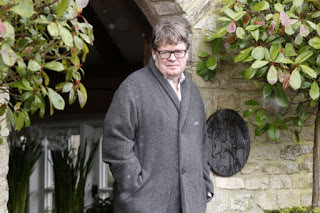 James Runcie - a kind of southern Alan BennettAll right, so they are a bit cosy – but everyone has their comfort read. And I was once married to a clergyman’s son, so it takes me back into a world of baffling parochial and diocesan intrigue and the splitting of microscopic moral hairs. My late father-in-law (St John's College, Oxford) also read the grace in Latin and, as he was a widower, the single women of his congregation were given to throwing themselves at the vestry door (metaphorically speaking). There was a great deal of material for fiction. I can see where James Runcie gets his plots!
James Runcie - a kind of southern Alan BennettAll right, so they are a bit cosy – but everyone has their comfort read. And I was once married to a clergyman’s son, so it takes me back into a world of baffling parochial and diocesan intrigue and the splitting of microscopic moral hairs. My late father-in-law (St John's College, Oxford) also read the grace in Latin and, as he was a widower, the single women of his congregation were given to throwing themselves at the vestry door (metaphorically speaking). There was a great deal of material for fiction. I can see where James Runcie gets his plots!

I’ve always loved solving mysteries, in the way that I love puzzles of any kind, so crime fiction has been an addiction since childhood. (Remember Nancy Drew?) Agatha Christie was on the bookshelves at home, but I always found her books rather cold and clinical. My mother had the Father Brown mysteries by G.K. Chesterton and, although I didn’t like them as much as she did, I liked the idea of natural justice that they put forward. Father Brown’s solution to the case didn’t always involve the police – but the punishment always fitted the crime.
James Runcie’s Grantchester mysteries seem to follow this tradition. The 32 year old hero, Canon Stephen Chambers, has a privileged position as an Anglican priest – people tell him things and feel that he has a right to probe their consciences and ask awkward questions about their private lives. The stories begin in 1953 and continue through to 1977, so we see the character develop.
I prefer the Stephen Chambers of the books to the TV detective priest, because the books are more literary (he’s very well read is our Stephen) and there is more moral subtlety. I don’t mind his religious dilemmas, even though I’m an atheist, because he is much more of a Doubting Thomas than Father Brown ever was. Less smug too, and very human. The TV adaptations make Chambers far too black and white. I watched a couple of them and then didn’t bother to watch again. The books are more ‘real’.
What I do like about the stories is what they reveal of village life with its hierarchies, jealousies and snobberies – the gossip and the secrets that are never really secret. And they are very well crafted- Runcie is a formidable writer, not surprising given his personal history. He is the son of a former Archbishop of Canterbury, born in Cambridge, so he writes of what he knows. He is also a film maker, novelist, TV producer and playwright, and Fellow of the Royal Society of Literature. His CV is awesome.
 James Runcie - a kind of southern Alan BennettAll right, so they are a bit cosy – but everyone has their comfort read. And I was once married to a clergyman’s son, so it takes me back into a world of baffling parochial and diocesan intrigue and the splitting of microscopic moral hairs. My late father-in-law (St John's College, Oxford) also read the grace in Latin and, as he was a widower, the single women of his congregation were given to throwing themselves at the vestry door (metaphorically speaking). There was a great deal of material for fiction. I can see where James Runcie gets his plots!
James Runcie - a kind of southern Alan BennettAll right, so they are a bit cosy – but everyone has their comfort read. And I was once married to a clergyman’s son, so it takes me back into a world of baffling parochial and diocesan intrigue and the splitting of microscopic moral hairs. My late father-in-law (St John's College, Oxford) also read the grace in Latin and, as he was a widower, the single women of his congregation were given to throwing themselves at the vestry door (metaphorically speaking). There was a great deal of material for fiction. I can see where James Runcie gets his plots!
Published on May 22, 2017 14:30



